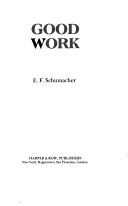Abacus Books
4 total works
How does our economic system impact the way we live? Does it really affect what we truly care about?
Oxford economist E. F. Schumacher provides an enlightening study of our economic system and its purpose, challenging the current state of excessive consumption in our society. Offering a crucial message for the modern world struggling to balance economic growth with the human costs of globalisation, Small Is Beautiful puts forward the revolutionary yet viable case for building our economies around the needs of communities, not corporations.
'One of the 100 most influential books published since World War II' The Times Literary Supplement
After he left the General Coal Board to build up the Intermediate Technology Group and to write Small is Beautiful, he continued to comment on energy policy. Beyond the question of energy, however, the book also includes Schumacher's ideas on public ownership, which are considered the most important on the subject since those of the Webbs and G. D. H. Cole. His opinions are particularly valuable since he was directly involved in the management of a nationalized industry during its formative years. This section of the book demonstrates the contribution an intellectual can make to the running of a business. Brought together from about fifty of Schumcaher's articles and speeches, by Geoffrey Kirk, a well-informed colleague for more than twenty years, Schumacher on Energy is distinguished by that originality, lucidity and freshness of thought which have appealed to the millions of reader of Small is Beautiful.

